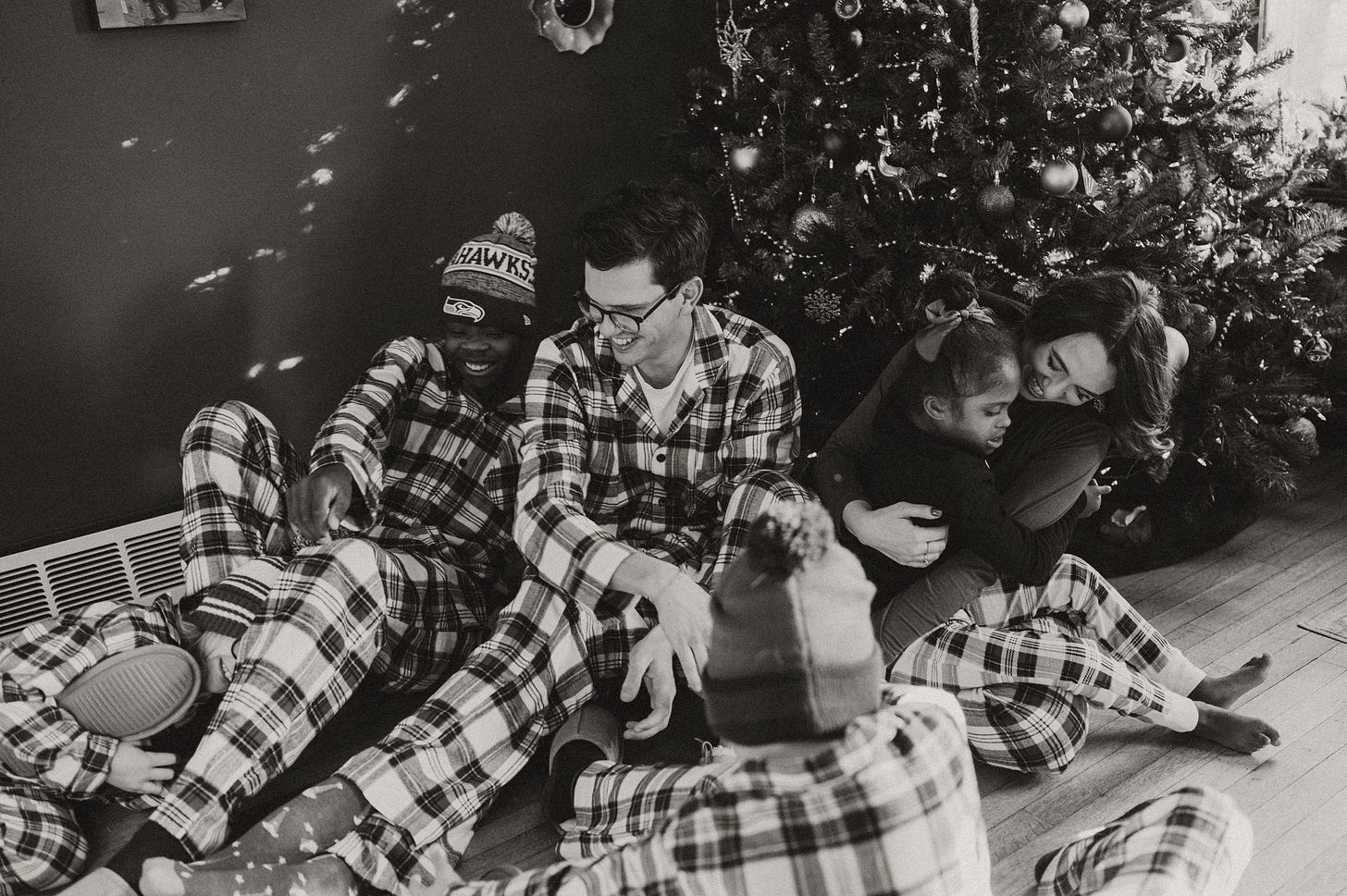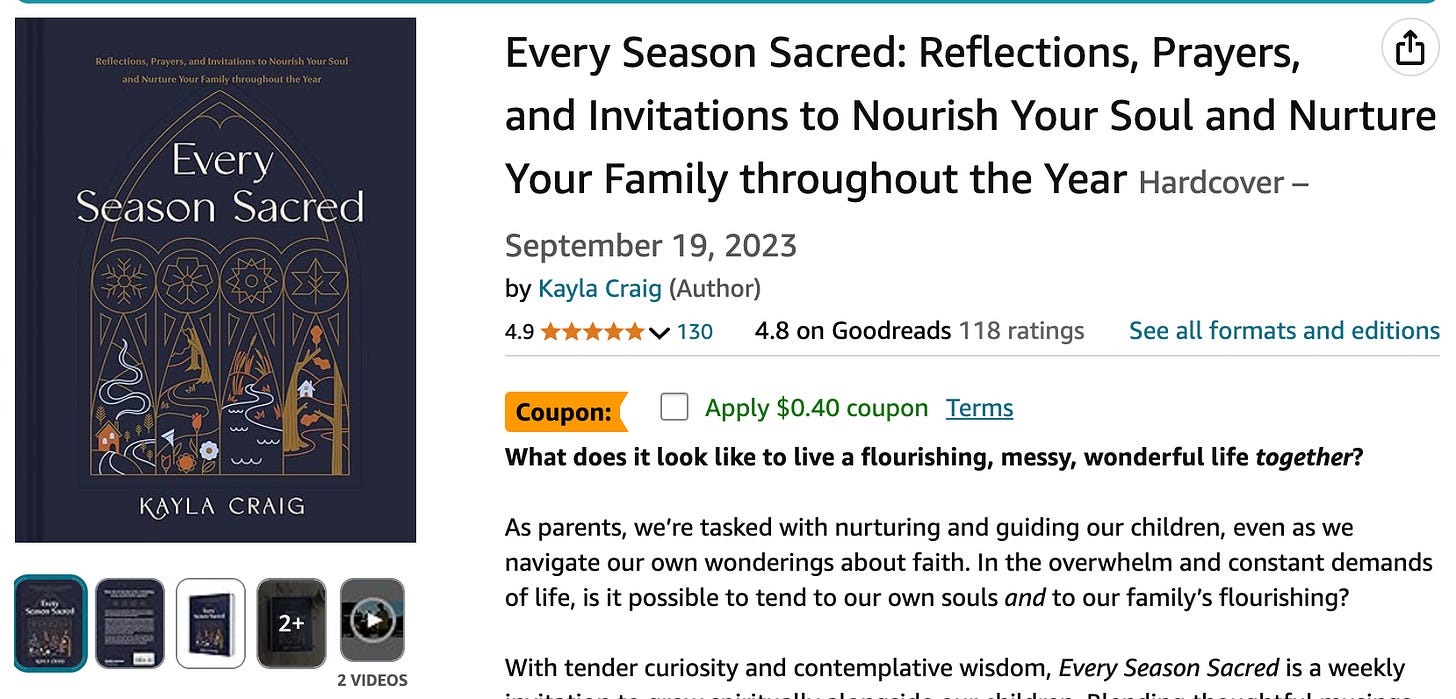⭐ Christmas: Hope is Worth the Risk
Advent, Week 4: Cynicism doesn't change the world. Hope does.
Hope isn’t flimsy—it’s a force that propels us toward God's presence and redemptive plan for all creation, for all time.
It’s vulnerable to hope. The more we hope, the more we can be disappointed. For those of us who bear scars from the hurt of this world, hope can feel scary—too risky, too unrealistic.
Cynicism seems like a safer, more straightforward path. But cynicism doesn't change the world—hope does.
Hope challenges us to declare, “It can be better,” and empowers us to make it so.
Our weary world doesn’t need any more cynics and scoffers—but as wars rage and divisions heighten, we desperately need hopebearers who point us to a better way, one where life is made new and lies of shame and fear don’t have the final say.
Our hope is a reflection of God’s plans for the world—plans for renewal and restoration in the face of death and despair.
Joseph and Mary hoped against hope. In the face of impossibilities, they believed in the possibility of a better world. They placed their trust in God alone. Their stories, as recounted in Matthew 1:18-25 and Luke 1:46-55, are testaments to the transformative power of hope still accessible to us today.
Joseph acts with hope. Mary proclaims it. And their choice to trust God has reverberations that echo into eternity.
When an angel appears to Joseph in a dream, he is told not to fear taking Mary as his wife, for the child conceived in her is from the Holy Spirit. Joseph's decision to embrace this divine assurance— rather than succumb to societal expectations to untangle himself from his pregnant fiancée—is a radical act of hope.
“The language of a dream is the language of hope,” writes Bishop Michael Curry.
Propelled by this hope, Joseph uses his position not just for personal faithfulness, but as an act of profound communal responsibility by choosing to protect and stand by Mary. Instead of living out of fear for what others may say or think, Joseph places his hope in something bigger than himself.
Every day, we have the chance to choose hope and enter into God’s redemptive dream for the world—even when it disrupts our understanding and expectations (perhaps especially then).
Mary’s response to her calling is equally revolutionary. In light of all that has been foretold, she sings a hopeful anthem for the ways God turns our world upside down and brings it right side up by bringing down the mighty, exalting the humble, filling the hungry, and sending the rich away. As she sings, Mary weaves a vision of the world as God intends it, stitching together a pattern of justice and mercy in her words.
Her hope in the promise of God transcends time and space, extending a sacred invitation and inspiring us today to live out our faith in tangible, transformative ways.
Mary’s words hark back to imagery seen throughout the Hebrew Bible. Theologian Walter Brueggemann writes: “The hope articulated in ancient Israel is not a vague optimism or a generic good idea about the future, but a precise and concrete confidence in and expectation for the future.”
Reflect on how you can embody hope in uncertain times. How can you, like Joseph, use your influence to protect and uplift? How can you, like Mary, voice a hope that challenges the status quo and sings of a reality where justice and mercy reign?
As you light the final Advent candle, let it symbolize the hope that Christ brings into our world—a hope not just for peaceful times, but also for moments of darkness and difficulty. May the steady flame of hope renew your courage and inspire you to act as you enter into an extraordinary story of redemption and love.
In this season of hope, may you find the courage to hold onto hope and act on it, to let the divine trust of Mary and Joseph weave through the fabric of your life.

A Blessing
Lies of cynicism are loud, and so are the voices of others—but, beloved, hope is worth fighting for.
May the Spirit of God surround you this season so that you might trust like Joseph and sing like Mary. The same hope they held is still alive today, transforming creation into God's will for justice and peace.
As you prepare your heart for Christ’s arrival, may you make room for God’s presence, and may your actions reflect God’s hope for humanity.
The above reflection and blessing were written for Words for the Beginning: A Sanctified Art advent commentary. I recently learned that more than 3000 churches worldwide have used the resources, which is humbling. I’m honored to have contributed.
Letting Go of the Perfect Christmas

‘Tis the season of Christmas cards and end-of-year recaps. We share our vacations, milestones, and biggest wins from the year. And there’s nothing wrong with sharing the good in our lives — joy worth celebrating! But our winning write-ups don’t include the sleepless nights, the dreams we had to let go of, or the hurts hidden inside our weary hearts.
When another glossy photo lands in my mailbox, it’s easy to assume the sender’s life is as perfect as the card itself. It’s easy to get trapped in a snowbank of comparison, believing I’m the only one sitting in the gap between how I wish things were and how they are.
As I hang our Christmas cards on our door frame, I’m not immune to envy and jealousy that stick to me like the tape I use to hang the cards. But I have to remind myself that our lives are more than a few curated highlights.
Recently, two friends told me about amazing overseas vacations. “You must have had an incredible time!” I said, but I was really thinking, It must be nice to travel like that. Both confided that their trips weren’t quite as perfect as the pictures made them look. From the outside, you couldn’t see the arguing spouses or the son stuck in the hotel room with food poisoning.
The truth is, this sparkling season has a shadow side. Sorrow, comparison, and exhaustion often linger at the edges of our joy, casting darkness over the twinkle lights that frame the windows.
For many of us, Advent carries a weight, like your snow-soaked mittens do after a snowball fight — heavy and cold and clinging no matter how hard you try to shake them off. Maybe your heart weighs heavy with the loss of a loved one, strained relationships, or unmet expectations.
If you’re scrolling your social media this holiday season and feel the pangs of comparison, you’re not alone. I’ve been taking a break from the glow of instant photos and the steady stream of updates. It’s been freeing — not striving to share the perfect post but living into each moment God has brought me into.
This pause has reminded me that life doesn’t need to be staged to be sacred.
Advent is a counter-narrative to perfectionism. Year after year, we set aside time to anticipate when Love came down, entered our mess, and changed the world forever. When we remember this is our truest reality, we can open our waiting hearts to welcome a God who enters into the imperfections of our real lives. We can loosen our grip on the pressure we feel about putting on a polished show.
What if this Advent we prepared room in our hearts for the glory of presence instead of the empty chase of perfection? What if we stopped striving to make everything just right and instead allowed ourselves to rest in the hope that’s already here?

Prayers to Borrow
If the words I’ve shared have been meaningful to you, it’d mean so much to me if you supported my writing by purchasing copies of my books!
Guest Liturgy
, our guest liturgist this week, is a writing friend of mine and senior editor at HarperOne. Lucky for us, she is also the author of the newly released Even After Everything: The Spiritual Practice of Knowing the Risks and Loving Anyway.
A Prayer for Those Who Ache this Advent
Creator God who made us for life and love,
we come to you now with honest prayer:
things are not as they should be.
Meet us in our bleak midwinter,
and in these cold nights, may we see stars—
rekindle in us wonder in surprising places
even as we come into this season weary.
When the news is worse than we thought,
they’re gone too soon,
the “no” hurts too much,
the kids are not all right,
and the world feels so very dark,
may your divine accompaniment be deeply felt
and your empathy with us be experienced
as a constant in the chaos.
As we ache for our bodies, our relationships, our world to be made right,
may we know that our cries and calls for help are heard.
Most of all, may we know you as the God of Incarnation:
Love rushing to be with us in all the places where it hurts.
The Very Essence of Advent
Below is an excerpt from Even After Everything.
“The God of Advent is not a God of indifference, but the God who imagined mirror neurons into existence—the cell network responsible for so much of what makes us human, which is the basic ability to read and respond to the emotional needs of others. Every human encounter of empathy begins with mirror neurons firing in witness to pain.
It is fitting, then, that the sacred year begins with Advent. Human pain is the call—every nerve ending crying out. The Incarnation is the response—every mirror neuron of God firing, volcanic in awakening. God hears the crash and cries of our great fall and, like a mother, comes running. Emmanuel rushes through time and space to be not just near our hurt, but human with us in it.
What I had missed was the very essence of Advent: This is an entire season dedicated to hearing the hurt and naming the night.”
Read more in chapter 4: Naming the Night in Even After Everything.
My endorsement: "With clear-eyed wonder and contemplative wisdom, Stephanie Duncan Smith's voice echoes the likes of Frederick Buechner and Madeleine L'Engle-and I don't say that lightly. She carves out space for us to reflect on who we've been, who we are, and who we might someday be. I highlighted the whole book and imagine it'll be on my desk for years."
Remember to Breathe this Week
Year of Breath subscribers receive weekly curated playlists, intentional breath prayers, reflection prompts, Scripture readings, phone wallpapers, and benedictions.
Subscribers not only support this mother-writer but intentionally invest in their own spiritual practices and soul care too.
Breath Prayer
Christmas is nearly here, and with it, hope—the hope that God is with us, that love has come down, and that light shines in the darkness. Breath prayers are a way to quiet our hearts in the chaos and connect to God's steady presence.
This week, as we light the last Advent candle and celebrate Christ’s arrival, let these prayers guide you into moments of reflection and rest. You can pray them in the morning's quiet (all the parents said LOL), as you prepare meals, or even in the stillness before you drift to sleep.
Weekly Breath Prayer
Repeat this prayer throughout the week to anchor your heart in hope.
Inhale: God of hope,
Exhale: Your love renews.
Daily Breath Prayers
Use these prayers each day as small reminders of God’s presence and hope.
Keep reading with a 7-day free trial
Subscribe to Liturgies for Parents to keep reading this post and get 7 days of free access to the full post archives.









